From the highs of sporting victories to the lows of military invasion, the history of the Czech lands has been a tumultuous one. Here are some of the events which stand out in the land’s history.
The Teens and Twenties: an era of hope and prosperity.
1918 October 28th Czechoslovakia is declared independent. Tomáš Garrigue Masaryk is the first president of the new nation.
1919 April 15th The first Czechoslovak Crown banknotes are issued.
1920 Karel Čapek writes the play R.U.R and gives the world the word ‘robot’ in its modern sense. His brother Josef was the one who suggested the word.
March 30th – The Czechoslovak flag is approved (the same design is used by the Czech Republic today.)
Autumn – The puppet Spejbl steps onto the stage. He is joined six years later by his son Hurvínek. The precise date is not known.
1921 The first volume of Jaroslav Hašek’s The Fateful Adventures of the Good Soldier Švejk is published. Hašek dies two years later, before completing all six volumes he intended.
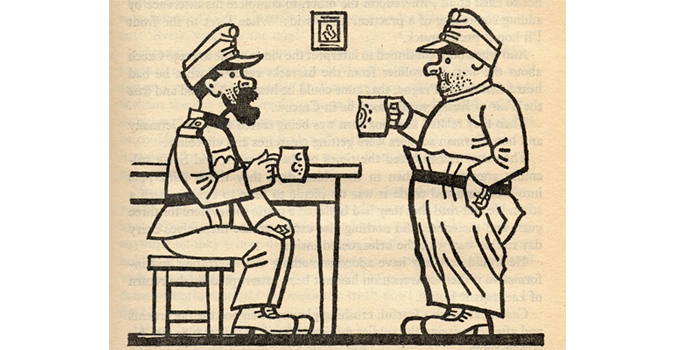
Good Soldier Švejk
The Thirties: From the Great Depression to the Protectorate
1933 The Great Depression reaches its peak in Czechoslovakia. Industry is down by 40%.
February 18-26th – Czechoslovakia hosts the International Ice Hockey Federation (IIHF) World Championships for the first time. The host country finishes third.
1934 June 10th The Czechoslovakian National football team reaches the final of the FIFA World Cup, only to lose to Italy.
1935 December 14th Masaryk resigns as president.
December 18th Edvard Beneš becomes president.
1937 September 14th Masaryk passes away.
1938 September 29th The Munich Pact between Germany, Great Britain, France and Italy cedes the Sudetenland territory to Nazi Germany.
October 5th – Beneš resigns as president. Emil Hácha replaces him on 30th November.
1939 March 14th Slovakia splits from Czechoslovakia to form the First Slovak Republic.
March 15th – Prague is occupied by Nazi Germany.
November 17th – 1200 students are arrested by the Nazis, following a mass procession in honor of Jan Opletal, who was killed when police fired on a demonstration he was attending.
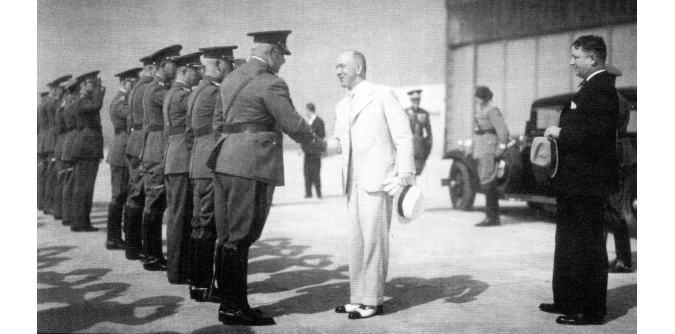
President Beneš in Olomouc
The Forties: Totalitarianism of two kinds
1942 May 27th Operation Anthropoid is carried out. Jozef Gabčík and Jan Kubiš attempt to assassinate Reichsprotektor Reinhard Heydrich. Heydrich died from his wounds on 4th June.
June 10th – In response to the attack on Heydrich, the Nazis raze the village of Lidice. Two weeks later the village of Ležáky meets a similar fate.
1944 August 29th The Slovak uprising starts. Slovak resistance forces challenge the pro-Nazi Tiso regime. The insurrection was forced back by October that year.
1945 May 5th-8th the Prague Uprising takes place.
May 8th – German forces surrender to the Allies.
May 6th – 11th Prague offensive is fought between Soviet forces and Nazi troops unwilling to surrender.
August 2nd – German and Hungarian citizens of Czechoslovakia have their citizenship revoked and are expelled from the country. These are the so-called “Beneš decrees” made while Beneš was still president in exile.
October 28th – Beneš is reinstated as president of Czechoslovakia.
1946 August A film festival takes place in Karlovy Vary and Mariánské Lázně, which eventually becomes the Karlovy Vary film festival.
1947 February 23rd Czechoslovakia wins the IIHF World Championships for the first time. The country also hosted the championships this year.
1948 February 25th Beneš accepts Communist-led government under Gottwald. The event is often known as the February coup.
March 10th – Jan Masaryk, son of Tomáš Masaryk, is found dead below the window of his bathroom at the Foreign Ministry.
June 7th – Beneš resigns as president rather than sign the new constitution drafted by the communist-led government. Gottwald, who is then prime minister, replaces him.
September 3rd – Beneš passes away.
The Fifties: Communist rule is consolidated, yet innovation manages to continue
1950 June 27th Milada Horáková is hanged, having been found guilty of treason, following a nine-day trial. The trial garnered attention from around the world. Notable people who attempted to have her life spared included Albert Einstein, Winston Churchill and Eleanor Roosevelt.
1952 November 27th The Slánský Trial concludes with Rudolf Slánský and 13 other men sentenced to death or life imprisonment.
1954 February 25th Regular TV broadcasts begin.
1955 Drahoslav Lím invents the polymer pHEMA.
May 1st The giant statue of Stalin on Letná is unveiled, two years after Stalin’s death. It was the biggest statue of its kind until it was destroyed as part of de-Stalinisation in 1962.
1957 The first episode of Krteček is screened on TV.
1959 October 30th The first play is staged at Theater Semafor, which is to become one of Prague’s most important theaters.
December 10th – Jaroslav Heyrovský is awarded the Nobel Prize for Chemistry.
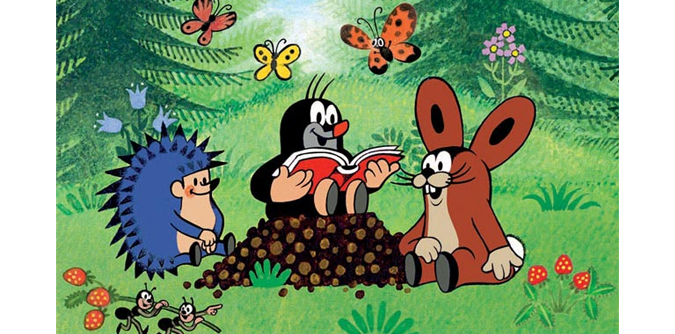
Krteček
The Sixties: A period of political easing
1960 Kofola is launched on the market.
1961 This year Otto Wichterle, a chemist, makes the first soft contact lenses out of pHEMA.
June 17th – The Czechoslovakian Football team again finish second in the FIFA World Cup.
1963 Karel Gott wins his first Zlatý Slavík (Golden Nightingale), a music award based on a poll.
February – The results of the Kolder Commission show that the evidence in the Slánský Trial and other show trials was fabricated.
December 3rd – Václav Havel’s play “The Garden Party” is staged for the first time at The Theater on the Bannister (Divadlo Na zábradlí).
1965 May 1st American poet Allen Ginsberg is elected Král Majáles (The King of May).
1966 February 26th A chest containing the works of Cimrman is ‘discovered’.
1965 April 5th Jan Kádár’s film The Shop on Main Street (Obchod na Korze) is the first Czechoslovak film to win an Academy Award for Best Foreign Film.
1967 April10th Jiří Menzel’s Closely Observed Trains (Ostře sledované vlaky) wins the Academy Award for Best Foreign Film.
1968 April 1st Alexander Dubček, the first secretary of the Czechoslovak Communist Party, starts a program of greater political freedom called Prague Spring.
August 21st – Warsaw Pact countries, led by the USSR, invade Czechoslovakia, ending the period of political liberalization.
1969 January 19th Jan Palach dies, having set fire to himself three days earlier at the top of Wenceslas Square. He committed suicide in protest to increased censorship and the Soviet invasion.
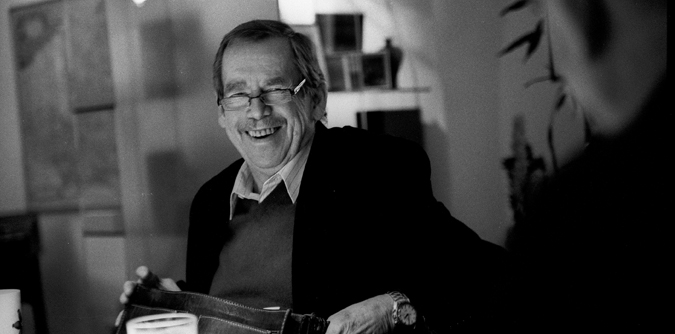
Václav Havel
The Seventies: “Normalization” – hard-line rule is again consolidated.
1971 This year Josek Škovorecký and his wife Zdena Salivarová set up 68 Publishers, a company which publishes the banned work of Czech and Slovak writers.
1973 Color TV broadcasts begin on ČT 2.
1976 Škoda 120 rolls off the production line.
March 17th – Members of the Plastic People of the Universe are arrested, inspiring the formation of Charter 77.
1977 January 6th Václav Havel, Pavel Landovský and Ludvík Vaculík, from Charter 77, are arrested trying to deliver the group’s proclamation along with 242 signatures to the Federal Assembly.
1978 March 2nd Vladimír Remek becomes the first Czechoslovak to go into space. He docked with the Soviet space station Saljut 6 the next day and returned to Earth on March 10th.
1979 May Havel starts a four-year prison term.
The Eighties: The unexpected last decade of the regime
1980 January 3rd Hana Mandlíková is the first person from Czechoslovakia to win a Grand Slam tennis tournament, winning the Australian Open.
1984 June 10th Ivan Lendl wins his first Grand Slam title at the French Open.
December 10th – Jaroslav Seifert wins the Nobel Prize for Literature.
1985 September 8th Lendl wins his first US Open title. He would go on to hold the title for the two following years.
1987 Škoda Favorit is produced.
1989 November 17th A student demonstration to mark the 50th anniversary of the closure of Czech universities by the Nazis is held. This demonstration was a key factor in the start of the Velvet Revolution.
November 27th – A general strike is called and demonstrations demand free elections, a new constitution and the resignation of the Central Committee.
December 29th – Havel is elected president.
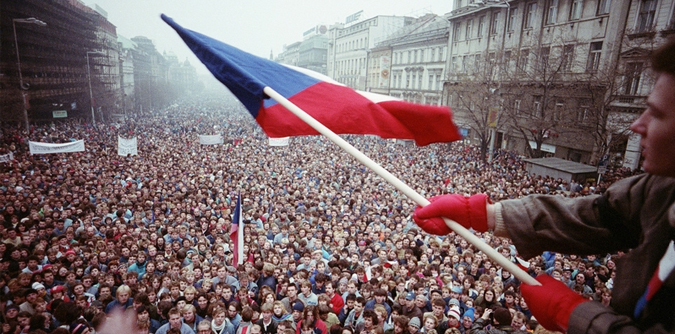
the Velvet Revolution
The Nineties: Czechoslovakia “returns to Europe” and decides to split.
1993 January 1st The Czech Republic and Slovakia become two independent states.
January 26th – Havel is elected as president of the Czech Republic.
1997 March 24th Kolya (Kolja in Czech) wins both the Academy Award and the Golden Globe for Best Foreign Language film.
May 5th – The Czech Republic wins the IIHF World Championships for the first time as a separate state.
1998 February 22nd The Czech national ice hockey team win gold at the Winter Olympics in Nagano.
1999 The Czech Republic joins NATO.
The New Millennium: a period of further integration
2002 August 7th and 8th Heavy floods affect Prague.
2003 March 7th Václav Klaus is elected president for the first of his two terms.
2004 May 1st The Czech Republic joins the European Union with 10 other nations.
2008 February 24th Markéta Irglová and Glen Hansard win an Academy Award in the category Best Original Song for “Falling Slowly”.
2011 December 18th Former President Václav Havel passes away.
Which memorable date do you think should be included here?
Related articles












 Reading time: 7 minutes
Reading time: 7 minutes 


























